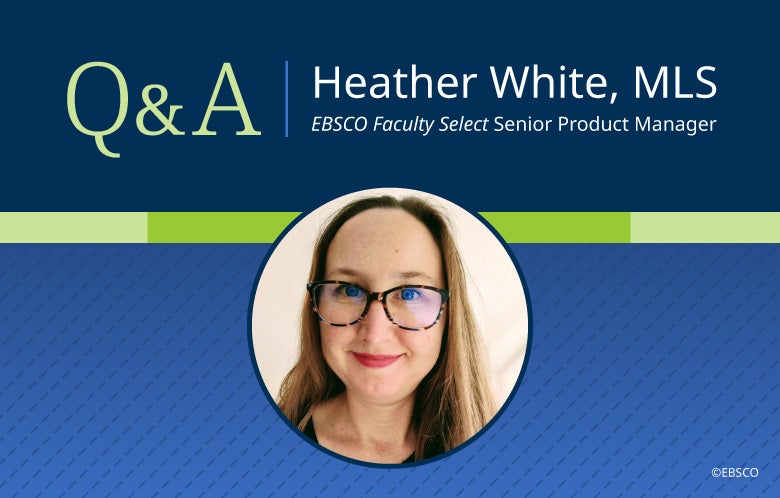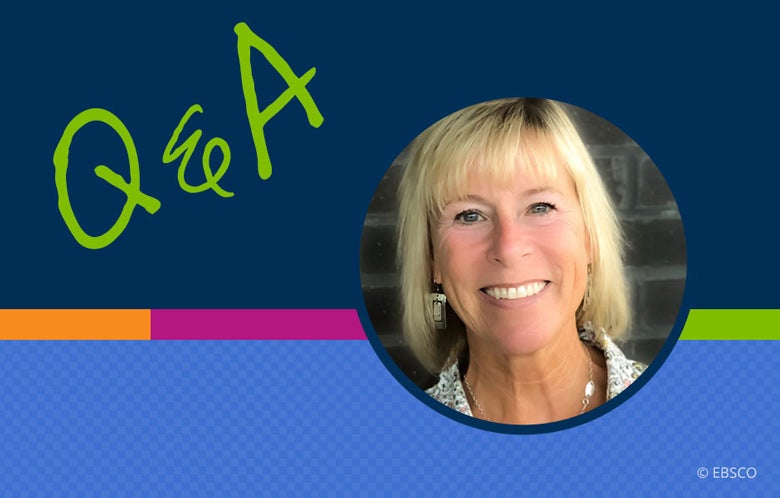Heather White, MLS, recently joined EBSCO Information Services as the Senior Product Manager for EBSCO Faculty Select. Prior to joining EBSCO, Heather worked for 17 years as an academic librarian, starting out in a high school library, then moving into reference and instruction librarian roles in college, university, and community college libraries. For the past 10 years, Heather was a technical services librarian at Mt. Hood Community College (MHCC), where she oversaw acquisitions, cataloging, collection management for print and electronic resources, ILS administration, and library technology in general. Learn more about Heather and how she plans to bring her librarianship experience to her new role at EBSCO.
I know from my own experience supporting faculty in textbook affordability that OER has many benefits beyond just being free for students.
I know from my own experience supporting faculty in textbook affordability that OER has many benefits beyond just being free for students.
Tell us about your experience as a librarian before coming to EBSCO.
While I spent the past 17 years working as an academic librarian, for the last five years I was also MHCC’s Open Educational Resources (OER) librarian, supporting faculty and the college with open licensing and open pedagogy. I managed internal and external OER grant projects and facilitated OER legislative compliance for the college, which led me to work with campus stakeholders such as the bookstore, IT, faculty unions, student government, the college president, foundation, and the board of education. I also worked closely with our library cataloger on OER metadata to improve discovery. We created an OER MARC template and an OER e-book publishing service to standardize publication data for cataloging and discovery, while making it easier for faculty to customize OER for their students. We worked on the OER Metadata Rosetta Stone, an international initiative that translated our OER MARC template to LRMI and Dublin Core metadata languages, to help bring the concept of library bibliographic control to OER databases run by non-librarians. As you can see, OER is a passion of mine and I’m proud of the work I’ve done in this space, but I know there is much more to be done.
Why are OER and affordable resources so important?
Commercial textbook prices increased 153 percent between 2000 and 2021. According to a recent USPIRG study, more than 65 percent of students in 2020 skipped buying a textbook due to its high cost, and 21 percent skipped buying online access codes, despite them knowing it would negatively impact their grades. These students are prioritizing paying their bills and feeding their families. None of this is new, but the COVID-19 pandemic accentuates the impact; many students have lost their jobs and some even their homes. The need for an affordable education has never been so dire. Many faculty have been aware of this financial barrier to education for a very long time and have explored OER and other low-cost textbook strategies to help. And I know from my own experience supporting faculty in textbook affordability that OER has many benefits beyond just being free for students.
For example, when one faculty member I worked with saw her students struggling with one part of her lesson, she logged into her customized version of an OpenStax biology textbook and involved her students in rephrasing the paragraphs so it would make the most sense to them. Another faculty member wrote a world mythology textbook through an equity lens, combing through global history, organizing his chapters around themes balanced across diverse cultures, instead of the western perspective that’s historically dominated the narrative. He wrote, published, and started using that e-book within eight months. Both of these OER textbooks are completely free and wide open for anyone to adopt and modify at any time for their own classes, as long as they can find them.
What excites you about working on Faculty Select?
I’m so happy that I get to continue working on OER discovery. Like the two books I mentioned above, there’s a lot of high-quality OER out there that isn’t being found because it’s not going through formal publishing channels and lacks what EBSCO calls Enhanced Subject Precision –– metadata enhancement to give search engines more context when running a search query. As a technical services librarian, it’s always bugged me how poor the OER discovery experience is. With Faculty Select, I feel like I’m in a position to really do something about that.
I’m also very excited to explore the options for DRM-free e-book acquisitions to boost the usage stats of library e-resources, thereby helping to justify library budgets. I also look forward to helping libraries expand their collection development, acquisitions, and cataloging workflows to include open content, particularly when it’s their own faculty that are publishing it. And of course, I’m delighted to help students save money on their education, while supporting faculty innovation in teaching and learning on a global scale.
What’s next for Faculty Select?
I see a lot of room for growth in Faculty Select. Right now, it’s a collection of formally published OER, OA and DRM-free content. Initially, I’m finetuning the current discovery experience and following up on enhancement requests from our existing customers, such as improving the types of reports possible for tracking faculty adoptions. We would like to provide insight into how much money is being saved by adopting open and DRM-free e-books, as well as expanding the OER content, particularly for ancillary materials. I’m also working on marketing materials for librarians to show to their college and university administrators, LMS instructional designers, and faculty department chairs.
I am eager to learn from our customers regarding what they’d like to see from Faculty Select. It’s imperative that EBSCO stays true to the spirit of the Open Education movement as we integrate open content with demand-driven acquisitions of library e-resources, for example, DRM-free e-books. If libraries are able to allocate budget lines for unlimited user licenses of e-books requested by faculty, then Faculty Select can help libraries prove their relevance to their institutions by leveraging free and open content as a complement to their existing collection development policies for supporting students and faculty.
What’s important for students is that library resources feel free, whether it’s OER or not. What’s important for faculty is that the content is high quality and under their control.
What’s important for students is that library resources feel free, whether it’s OER or not. What’s important for faculty is that the content is high quality and under their control.
What’s important for students is that library resources feel free, whether it’s OER or not. What’s important for faculty is that the content is high quality and under their control. I think Faculty Select can meet both these needs through a library collection development philosophy that’s deeply embedded with faculty’s curriculum design and online instruction.



